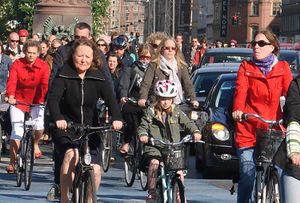English summary: Forskelle mellem versioner
Oprettede siden med "<h2>The clinker boat</h2> The contribution is submitted by representives of the Danish Viking Ship Museum, Han Herred Sea Boat Association and the Wooden Ship Association..." |
Ingen redigeringsopsummering |
||
| Linje 3: | Linje 3: | ||
The clinker boat is a particular Nordic boat type, which during the last 2000 years has had great impact on shaping Denmark as a seafarers’ nation. The boat has varied in shape and size. Depending on the purpose and use as well as for whom it was built and the materials available. | The clinker boat is a particular Nordic boat type, which during the last 2000 years has had great impact on shaping Denmark as a seafarers’ nation. The boat has varied in shape and size. Depending on the purpose and use as well as for whom it was built and the materials available. | ||
[[Fil:Erhvervsfiskeri med klinkbyggede havbåde.png|thumb | [[Fil:Erhvervsfiskeri med klinkbyggede havbåde.png|thumb|Photographer: Kirsten Monrad Hansen, Han Herred Havbåde]] | ||
| Linje 10: | Linje 10: | ||
"The typical occasional song is a sing-along written for a specific event and is based on a well-known tune. In Denmark, the phenomenon dates back to the 17th Century. The genre also contains examples of song written for a specific event but in a newly composed tune and sung by a choir or a single person." | "The typical occasional song is a sing-along written for a specific event and is based on a well-known tune. In Denmark, the phenomenon dates back to the 17th Century. The genre also contains examples of song written for a specific event but in a newly composed tune and sung by a choir or a single person." | ||
[[Fil:Collage.png|thumb | [[Fil:Collage.png|thumb|Danish Folklore Archives]] | ||
| Linje 17: | Linje 17: | ||
"People has always knitted and will probably continue to do so. However, if the tradition is to maintain its popularity, the craft needs safeguarding through visibility and educational efforts." | "People has always knitted and will probably continue to do so. However, if the tradition is to maintain its popularity, the craft needs safeguarding through visibility and educational efforts." | ||
[[Fil:Strik 1.png|thumb | [[Fil:Strik 1.png|thumb|Photographer: Agnete Rasmussen, Gavstrik]] | ||
| Linje 24: | Linje 24: | ||
"The ballet school of the ballet master August Bournonville has been passed on from generation to generation for almost two centuries. The steps and the repertoire represents a particular way of dancing, mimic gesture and aesthetics." | "The ballet school of the ballet master August Bournonville has been passed on from generation to generation for almost two centuries. The steps and the repertoire represents a particular way of dancing, mimic gesture and aesthetics." | ||
[[Fil:Napoli til web.jpg|thumb | [[Fil:Napoli til web.jpg|thumb|Photographer: Martin Mydtskov Rønne / Royal Danish Theatre Archives.]] | ||
| Linje 31: | Linje 31: | ||
The theatre, the novel and the folk song is rooted in the art of telling stories. Based on a basic form the storyteller creates a story through improvisation and engagement with the audience. Both professionals and amateurs tell stories." | The theatre, the novel and the folk song is rooted in the art of telling stories. Based on a basic form the storyteller creates a story through improvisation and engagement with the audience. Both professionals and amateurs tell stories." | ||
[[Fil:Anne Marie & Vigga.JPG|thumb | [[Fil:Anne Marie & Vigga.JPG|thumb|Photographer: Unknown]] | ||
| Linje 38: | Linje 38: | ||
"Denmark is one of the countries in the world where most people bike around. Today most Danes learn to ride a bike before the age of 10 and about 50% of all Danes ride a bike several times a week. To many it is much more than just a means of transportation." | "Denmark is one of the countries in the world where most people bike around. Today most Danes learn to ride a bike before the age of 10 and about 50% of all Danes ride a bike several times a week. To many it is much more than just a means of transportation." | ||
[[Fil:Billede til cyklisme som levende kultur rev 2.jpg|thumb | [[Fil:Billede til cyklisme som levende kultur rev 2.jpg|thumb|Photographer: Unknown]] | ||
Versionen fra 23. nov. 2017, 17:05
The clinker boat
The contribution is submitted by representives of the Danish Viking Ship Museum, Han Herred Sea Boat Association and the Wooden Ship Association
The clinker boat is a particular Nordic boat type, which during the last 2000 years has had great impact on shaping Denmark as a seafarers’ nation. The boat has varied in shape and size. Depending on the purpose and use as well as for whom it was built and the materials available.
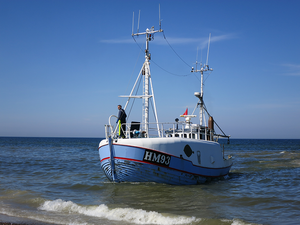
Occasional song
The contribution is submitted by film producer and author Ebbe Preisler
"The typical occasional song is a sing-along written for a specific event and is based on a well-known tune. In Denmark, the phenomenon dates back to the 17th Century. The genre also contains examples of song written for a specific event but in a newly composed tune and sung by a choir or a single person."
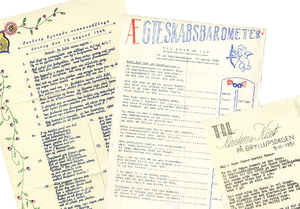
Knitting
The contribution is submitted by Agnete Rasmussen, a representative of the knitting association, Gavstrik
"People has always knitted and will probably continue to do so. However, if the tradition is to maintain its popularity, the craft needs safeguarding through visibility and educational efforts."
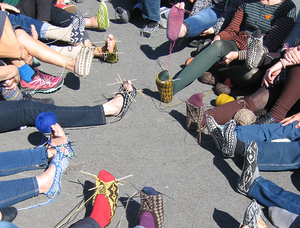
The Bournonville ballet tradition
The contribution is submitted by representatives of Royal Danish Theatre
"The ballet school of the ballet master August Bournonville has been passed on from generation to generation for almost two centuries. The steps and the repertoire represents a particular way of dancing, mimic gesture and aesthetics."
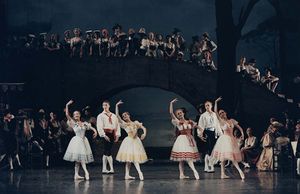
Story telling
"The contribution is submitted by storytellers Vigga Bro and Lise Marie Nedergaard
The theatre, the novel and the folk song is rooted in the art of telling stories. Based on a basic form the storyteller creates a story through improvisation and engagement with the audience. Both professionals and amateurs tell stories."
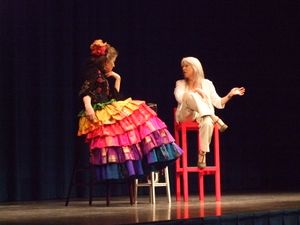
Cycling
The contribution is submitted by Danish Cyclists' Federation
"Denmark is one of the countries in the world where most people bike around. Today most Danes learn to ride a bike before the age of 10 and about 50% of all Danes ride a bike several times a week. To many it is much more than just a means of transportation."
